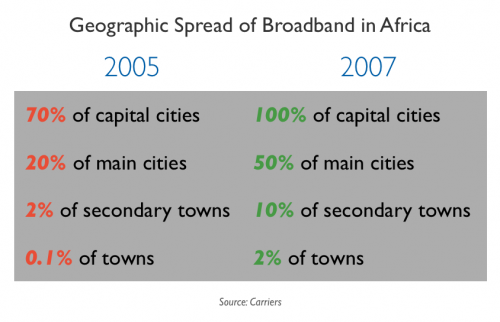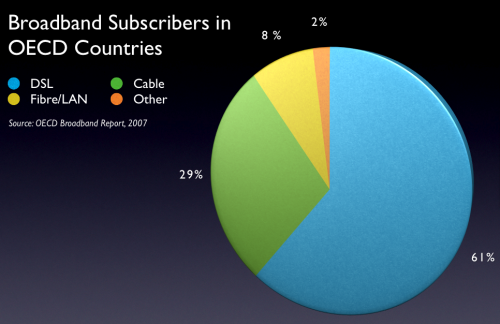Russell Southwood’s Balancing-Act newsletter is one of the best sources for internet and mobile statistics and reports in Africa. If you don’t read it, you should. If you run any type of mobile, web, or ISP-type company in Africa and you can afford it, then you should be buying the reports. Here are some excerpts from the recent one on Broadband Markets in Africa with some opinions thrown in by me.
Every country needs a price wiki
“Confusing range of pricing structures: Different pricing structures are applied to different delivery technologies (DSL, CDMA, WiMax, GPRS, EDGE, 3G, etc) and this makes “like-for-like†comparisons across all African countries an almost impossible task.”
No matter where you go in Africa there is no easy way to find out what types of broadband connections are available. There would be nothing more useful than a wiki-like tool that people could add to and compare against. A place where people who use these tools can put up their experiences and let others know about the “true” bandwidth provided by companies. This is especially true for residential customers.
Geographic broadband penetration
In the world’s most developed OECD countries, 61% of subscribers got their broadband through DSL services by 2007, 29% through Cable TV (CATV), and 8% through Fibre LAN connections. Just 2% of subscribers – some 3.455 million – subscribed to broadband through ‘other’ fixed wireless broadband services. In Africa, some 59% of broadband subscribers use DSL, just 1% use CATV, and the remaining 40% use wireless broadband.
Broadband to OECD countries in Africa by type
By December 2007 terrestrial broadband networks were now available in every capital city in Africa, some 50% of main cities, 10% of secondary cities and 2% of towns.
Traditional media is still king
Users in the more developed broadband markets make the Internet a modest supplement to a diet composed mainly of radio and television. As South African media owner Prakash Desai, CEO, Johnnic has pointed out in October 2007:â€99.9% of revenues are offline. The Internet doesn’t feature.â€
As elsewhere, the Internet in Africa has a symbiotic relationship with other media, particularly television. After a controversial scene in the second series of Big Brother, there were five million downloads of that scene. Ninety per cent of those downloads came from within Africa and of those 33% were from South Africa and 37% from Nigeria and Uganda. Similar response rates on SMS voting and competitions shows that this will be fertile ground for broadband content development as the subscriber numbers increases.
Mobile providers hold the high ground
On a continent that has a wide variation in the amount of internet access available when moving from urban to rural settings, the hand tips to those that have lower costs in rolling out infrastructure. Land lines, cable and fibre all cost a great deal to deploy. Mobile phone carriers have the ability to do so at a lower cost through towers. It’s a node vs line problem.
The key battle ground in the next five years will be between 3G services (or higher) offered by GSM and CDMA operators and fixed wireless broadband services. The outcome of this battle will shape the broadband experience in Africa, whether customers use mobiles as Internet access devices. …Mobile operators launching 3G networks are offering access speeds which compete with the broadband wireless services.
When that access is just as fast as land lines, then there’s no reason at all to stick with an internet solution that forces you to stay in one place.


November 14, 2008 at 1:21 am
I was VERY happy to hear that my organization recently purchase VSAT in S. Sudan for about $1000/month (after initial hardware installation costs) for 450kbps. I was told this is protected bandwidth and not shared. I was expecting more like $3000/month for that bandwidth. I’ll be on the ground soon to really test it out and see what our ‘true’ bandwidth is. Now we just have to figure out how to get decent bandwidth in Nairobi without paying the NGO inflated/profiteering price. After talking with quite a few people doing IT all over Africa, it seems that this profiteering issue is mainly isolated to E. Africa, mainly in Kenya.
November 14, 2008 at 1:23 am
I agree with Russell that every country needs a wiki re; price and service comparison. Here in Uganda, we have been working on this idea for a couple of months, and will launch our beta in the next few days. If we can make it work here, we will go to a Pan-African scale and build an NGO to do it on a public benefit basis. We have already secured a small amount of donor funding for this project, and have applied for more.
Doing meaningful (apples for apples) comparisons is difficult, but we have developed algorithms and strategies for this, as have other price and service comparisons websites. It will be MUCH harder for mobile telephony than for internet, but there is a need for both comparisons, so we will tackle mobile (eventually).
We will be looking for local partners in each country to make it easier, want to help in KE? Would you give us a feed of your blog? We would also like to include news and other interesting content at State of the Internet in Africa, in addition to the consumer data.
We are hoping to cooperate with BAA, and so gave them a heads up about this non-profit project several weeks ago, but they’ve obviously been busy turning out this report. We look forward to working with all those interested in African Internet developments, as we plan to crowd source the vast majority of our content.
November 14, 2008 at 2:08 am
@hash,
Looking at “the-dark-continent-its-still-dark”, I thought you may be interested in the title slide from this presentation that I gave to the UG Internet Governance forum about this project a few weeks ago.
While it LOOKS like the “world at night” image, it’s actually a snapshot of IP address density in the world, as you can see Africa is very dark.
I’ve put it online here for yoour perusal:
http://mctim.amsterdamned.org/content/docs/Inet_governance/State_of_the_Internet_in_Uganda_UG_IGF.ppt
November 14, 2008 at 2:12 am
@mctim – actually, it’s not out yet, but there is someone doing the ISP guide via wiki in Nairobi too. I’ll put you both in touch via email…
November 14, 2008 at 2:19 am
@mctim Interesting. I’m also currently working on a similar isp guide site for .ke
Would you be interested in comparing notes? I can be reached via email on bgm at 69mb.org
November 14, 2008 at 2:21 am
Ok I wish there was a way for wordpress to show new comments while I’m writing one 🙂
November 14, 2008 at 2:41 am
I can think of a few African capitals where I have not been able to find broadband over the last couple of years. And even when broadband is available, it is still very, very limited. I’d be interested to see a wiki for Francophone countries.
November 14, 2008 at 3:18 am
@bgm, just sent you mail, you have a more mature market, so chances of success are high, but provider cooperation is KEY!
@eddie
We will be doing a French version, and plan to cover all of Africa, including the Francophone region
November 14, 2008 at 8:14 pm
Whoa, where are they doing CDMA data and WiMax in Africa?
Also, in the “Geographic broadband penetration” section, how is that 100% of capitals figure calculated? I’ve been in Kinshasa and their broadband penetration is nearly non-existent with just a few guys tapping in to sat links or maybe that’s counting the MONUC’s massive uplink as part of the mix? There is no wired network that I know of as the wired phone lines are pretty much gone.
November 16, 2008 at 6:53 am
Mobile Broadband via EVDO or WiMAX-16e should be the way forward. Even GSM would be great, preferrably countrywide 3G by the mobile operators.
The arrival of undersea fibre-optic cables should also enhance broadband penetration.
November 17, 2008 at 5:44 am
There is also the possibility to use WLAN 802.11b/g that comes with some devices. This makes wifi hotspots a good business prospects.
November 19, 2008 at 5:01 am
There is also the possibility to use WLAN 802.11b/g that comes with some devices. This makes wifi hotspots a good business prospects
November 24, 2008 at 7:19 pm
For those of you working on wikis for African telecommunications options, you should get in touch with the folks at NPOKI – I’m pretty sure they’re working on something like this, too. Tell them James sent you 🙂
December 17, 2008 at 7:44 pm
Every country needs a price wiki for mobile/data connections.
So true, and not just from African ones! If anyone knows of one for US/EU, please let us know. If there’s isn’t, let the open community effort begin!
BTW if you want a source for contributing to such an effort, try site HowardForum.com, it’s the greatest, the information for the wiki is already built-in!
December 17, 2008 at 7:46 pm
HowardForums.com
February 26, 2009 at 6:20 am
from a user’s perspective, the problem with cell phone connections is still the speed. I use a GPRS cell phone modem for about $55/month (I’m in Uganda and only UTel to the best of my knowledge has launched their 3G network- and even that is only in Kampala). My average speeds are 5kbps which you have to admit is too slow for effective work.
With the cost of shared broadband (256kbps ) at approx $300/month (last I checked)- and the fact that I’m less often in my office and more in the field, this puts broadband out of running for me. Connectivity is still for now, largely what you pay for and standing from the 5kbps side of town, it ain’t that great.
Roll on the 3G networks people!
June 26, 2011 at 3:26 am
Hi
Been reading these coments and tried to get the “Broadband Markets in Africa” report to no avail.
I am busy trying to do research on the evolution of pricing strategies for broadband.
Be great if you can help in any other way.
Thanks
Zai, South Africa